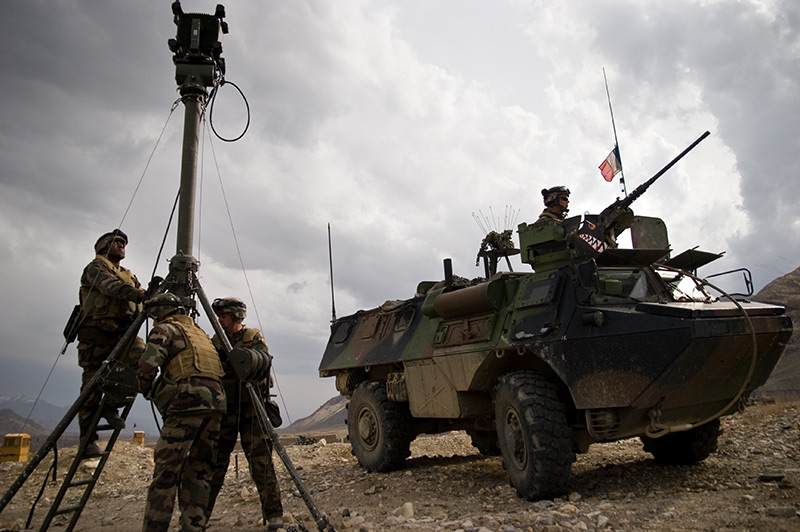The 13 points of the Franco-British Lancaster House agreement on defense
(B2) France and the United Kingdom signed on November 2 at the Lancaster House manor (in London), a qualified defense and security cooperation agreement provides for a series of cooperation, more or less concrete, in a series of 13 areas and defines a common policy on a few subjects shared by the two partners for the future of NATO (but not of the European Union), Afghanistan and Pakistan.
A new chapter in the history of the two countries
This agreement (1) opens - as David Cameron, the British Prime Minister pointed out - a "new chapter"between the two countries. One"treaty based on pragmatism not just sentiment" he clarified, even if "The United Kingdom and France have a common history since the two world wars and (that) our troops fight together every day in Afghanistan". " It is an unprecedented decision - said Nicolas Sarkozy - which shows the degree of trust that reigns between our two nations, unequaled in history. ". It corresponds, more or less, to what Hervé Morin announced a few weeks ago (2). But made a victim: the Europe of Defense (3).
A high-level group to oversee
A high-level group is created, responsible for to supervise the work in all these areas » and to report at the next Franco-British Summit, to be held in France in 2011. His task will be to finalize the various chapters of cooperation, many of which remain to be written.
The 13 domains cooperation
1. Nuclear arsenals. To strengthen cooperation in the management of nuclear arsenals, the French and the British are planning a joint facility in Valduc (France) where " modeled the performance of nuclear warheads and associated equipment, in order to ensure their long-term viability, safety and security ". A joint Technology Development Center in Aldermaston (UK) will support this project.
2. An Joint Joint Expeditionary Force (CJEF) “ suitable for a variety of scenarios, including high intensity operations. This Force will associate the three armies. It will include a land component made up of formations at brigade level, a maritime component and an air component with their associated staffs, as well as logistics and support functions. ". It won't be " not a standing force, but will be available on notice for bilateral, NATO, EU, UN or other operations ". This force will begin joint air and ground exercises in 2011 and a concept will be developed "by the next Franco-British Summit", in order to be " fully operational in the following years”.
3. Aircraft carriers. The United Kingdom has decided to install catapults and arresting devices on its future operational aircraft carrier. " This will allow British and French aircraft to operate from both countries' aircraft carriers ". From a cooperation on a maritime group around the aircraft carrier Charles de Gaulle, the United Kingdom and France will provide, by the beginning of the 2020s, the capacity to deploy a Franco-British integrated attack air force made up of elements from both countries ».
4. A400M aircraft. Future fleets of A400M transport aircraft will benefit from “integrated support”. Objective : " reduce costs, improve aircraft availability and pave the way for enhanced cooperation in maintenance, logistics and training ". One " bilateral common user group will be created to cooperate on A400M training systems, techniques and operational procedures, as well as simulator and in-flight training.
5. Nuclear submarines. The two countries have a view to jointly develop equipment and technologies for the next generation of nuclear submarines ". A joint study and agreements will be concluded in 2011.
6. Antimines. Plans for anti-mine equipment and systems will be harmonized ". A joint project team to define the specifications of a prototype anti-mine system will be set up in 2011.
7. Satellite Communications. A joint concept study will be launched in 2011 for the next satellites which will enter service between 2018 and 2022.
8. In-flight refueling. The excess British capacities of the FSTA (Future Strategic Tanker Aircraft) could be used by France. It remains to be fixed financially acceptable conditions for both countries ».
9 Drones. A " competitive evaluation phase will be launched in 2011, “ jointly funded », with a view to developing new equipment between 2015 and 2020. Objective: to share the costs of development, support and training for the next generation of medium-altitude, long-endurance surveillance drones. For the longer term, the needs and options for the next generation of combat drones will be evaluated together from 2030. And a common technological and industrial roadmap will be developed over the two years, which may lead to the “ decision to launch a joint technological and operational demonstrator program in 2012 from 2013 to 2018 ».
10. Missiles. The two countries have agreed on a ten-year strategic plan " and to "work towards the establishment of a single European industrial prime contractor", with the objective of achieving " savings of up to 30% ". A series of projects could be launched in 2011: development of the light naval anti-surface missile FASGW(H)/ANL, evaluation of improvements to the Scalp/Storm Shadow cruise missiles and a common roadmap for short-range air defense technologies. Cooperation in this area will serve as a “test” for other areas.
11. Research and technology. The two countries undertake to dedicate each an annual budget of 50 million euros for joint research and development projects " and " to increase this amount if possible ". Ten domains priority were drawn up: satellite communications, drones, naval systems and missiles, sensors, electronic warfare technologies and other equipment, as well as simulation and a co-funded PhD program...
12. Cyber attacks. A framework governing cooperation has been defined to strengthen the resilience of (both) national and common systems ».
13. Fight against terrorism. Several areas of cooperation are listed: early detection of terrorist activities and terrorist recruitment; sharing information on changes in the terrorist threat level assessment; prevention of terrorist threats in the nuclear, radiological, biological, chemical and explosive fields, in particular with the Cyclamen program to control traffic transiting through the Channel Tunnel; protection of populations and critical infrastructures; commercial aviation security; support for the development of the capacities of non-European partners in their fight against terrorism.
A renewed NATO and a reaffirmed commitment to Afghanistan
This declaration is also an opportunity for the two partners to reaffirm certain political options.
• On theNATO. At the next NATO Summit in Lisbon, the signatories repeat their wish "toimportant reform decisions to ensure the effectiveness and smooth functioning of NATO to obtain a new Strategic Concept which affirms "NATO's constant commitment to ensure the collective defense of our territories, to respond to threats to the security of the Allies, whatever their origin, and to new threats against the fundamental security interests of the Allies, and which affirms NATO's desire to work with a large number of partners", starting with the EU and Russia. They support the "anti-missile defense of the territories" project on the condition that it be: "(1) financially realistic, (2) consistent with the level of threat emanating from the Middle East, and (3) allows for a partnership with Russia ". Missile defense is a complement and not a substitute for deterrence “, recalls the statement. A French leitmotif in particular.
• On theEuropean Union, the statement is most limited and merely supports “ the objectives and full implementation of the decisions taken in December 2008 by the European Council, under the French Presidency of the EU ", at " encourage closer cooperation and complementarity between the EU and NATO "and hope" further progress by the end of 2011 ».
• On theAfghanistan. , both partners expect NATO to launches an orderly transition process to transfer security responsibilities to Afghan authorities in areas where the situation permits ". They support the efforts of the Afghan Government in its outstretched hand policy " to those who renounce terrorism "under two conditions that they" sever all relations with Al Qaeda and accept the Afghan constitutional framework ».
(Nicolas Gros-Verheyde)
(1) Agreement which covers several texts: the cooperation treaty itself, a specific treaty on joint nuclear installations, a letter of intent signed by the Ministers of Defense and a set (package) of joint initiatives. All summarized in a statement (read here).



Comments closed.